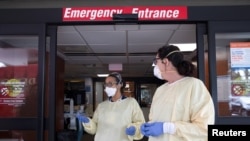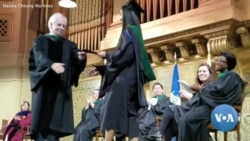Student Union
Health Care Jobs Spike in US After Pandemic

The fastest growing jobs in the fastest growing field — STEM, or science, tech, engineering and mathematics — are in health care.
“Health care is still booming,” said Marisa Streelman, national director of the Academy of Medical-Surgical Nurses (AMSN), a professional nursing association with members in the U.S. and internationally.
“Cybersecurity in healthcare, physical security, system improvements, telehealth, and the need for monitoring in the home and community health,” Streelman said, are some of the jobs in health care that are experiencing swift growth.
Among the top 30 fastest-growing professions are medical and health services managers, physician assistants, speech pathologists, substance abuse and mental health counselors, and marriage and family therapists, according to the U.S. Bureau of Labor Statistics.
The highest paying jobs in health care, according to BLS, are physician assistants, who make $115,390. Tech jobs like software developers by comparison make $110,140. Epidemiologists, or those who investigate patterns and causes of diseases, such as the COVID-19 pandemic, make an average of $74,560, according to BLS figures.
Aging populations and the COVID-19 pandemic have driven up the demand for healthcare positions, particularly for practitioners and technicians who diagnose or treat illness or have the technical skills to perform procedures and work with special equipment, according to BLS.
Veterinary skills are also in demand.
“What COVID did is it showed our gaps,” said Streelman, referencing the difficulty for some individuals to get time off work to visit a doctor when a video or phone appointment could suffice.
The pandemic has resulted in needs in telehealth and public health, such as for local health sites for emergency uses like testing centers, vaccines, and nursing staff.
“The pandemic brought to everyone’s attention that telephone triage and telehealth is safe, that it has the same outcomes as inpatient care, that is a huge satisfier to people that would much rather stay home and do their visit from the comfort of their home, especially if you’re sick,” said Kathleen Martinez, president of the American Academy of Ambulatory Care Nursing, an organization for a community of registered nurses.
Management consulting firm Mckinsey & Company said in February, online consultations through Practo, a telehealth company in India, grew more than tenfold from April to November 2020. Although in-office visits will resume, telehealth is likely to increase, the report added.
Research-based healthcare jobs will also see a rise in job opportunities resulting from the pandemic.
An updated BLS report in February found that there are “strong gains in jobs related to research and development in STEM (including physical, engineering, life sciences and health-related job clusters.”
The report predicts that there will be “strong growth” in specialized areas including, “epidemiologists, medical scientists, biochemists and biophysicists, and biological technicians.”
Emerging jobs
Nursing informatics is a discipline that will be in high demand and analyzes data to improve nursing practice. It is focused on technology helping the nursing workflow, such as managing electronic health records, or EHRs, that are required of all care facilities.
“Nursing informatics is huge right now,” said Streelman. “As more and more of our systems become electronic, and more and more of our equipment is used at the bedside and beyond, you see more and more equipment, wireless equipment and monitoring equipment that can be used in the home.”
Opportunities in biotechnology and biomedicine will be on the rise to assist the changes in health care.
Artificial intelligence
Artificial Intelligence, or AI, experts say, will move healthcare forward, as well. AI can analyze large volumes of data to more quickly diagnose and treat patients and illnesses.
“On the information technology side, we’re seeing engineers and scientists utilizing AI tools to transform the traditionally unstructured data, like MRI images, audio sounds, and diagrams which pose different kinds of information, which are unstructured and very hard to interpret,” said Linxin Gu, a Global Shaper at the World Economic Forum.
Gu began with a degree in biomedical engineering from Sichuan University in China and has studied at six institutions, including in China, Japan, and the United States.
Artificial intelligence
There are numerous applications for AI in healthcare, Gu said. She said someone interested in joining the industry should research it first to find where their personal interests fit.
“First understand yourself and then, second, do research about the people that are already holding your position,” she told VOA.
An early start and experimenting in different areas within the industry is crucial for success, she added. Qualifications and degrees needed to join the technological side of the healthcare industry also vary depending on the person’s goal, Gu said.
“If you want to work more on the information side,” she said, “there’s no required degree, but most people would get at least a bachelor’s degree to work on the IT side, either in biomedicine, biomedical engineering, or bioinformatics or computer science.”
Location is another key factor, Gu said. “In China, you have to get a master’s degree, because there are so many people with abundant degrees,” she said.
“If you want to conduct research,” Gu added, “master’s degree and a Ph.D. are both good. But in terms of independent research, you have to get a Ph.D.,” she said.
But ultimately, Gu said, several factors guide a person to achieve success in the industry. It depends on “where you want to go, what really interests you, and will you feel like you’re passionate about and where you want to work,” she said.
See all News Updates of the Day
- By VOA News
Competition grows for international students eyeing Yale

It’s tough to gain admission to Yale University, and it’s getting even tougher for international students as standout students from around the world set their sights on Yale.
The Yale Dale News, the campus newspaper, takes a look at the situation here.
- By VOA News
Student from Ethiopia says Whitman College culture made it easy to settle in

Ruth Chane, a computer science major from Ethiopia, writes about her experiences settling into student life at Whitman College in the U.S. state of Washington.
"The community at Whitman College made sure I felt welcomed even before I stepped foot on campus," she says.
- By VOA News
Claremont Colleges student gets a shock when she heads home to Shanghai

In The Student Life, the student newspaper for the Claremont Colleges, a consortium of five liberal art colleges and two graduate schools in Claremont, California, student Rochelle Lu writes about readjusting to her Shanghai home after spending a semester in the United States.
- By VOA News
Cedarville University aims to ease transition for international students

Cedarville University in the U.S. state of Ohio says it’s got more than 140 international students representing 44 countries.
Here, the school interviews Jonathan Sutton, director of international student services. He talks about his job and the opportunities for international students on campus.
- By VOA News
Morehouse College offers prospective students tips on applying and thriving

Morehouse College, a private, historically Black liberal arts college in the U.S. state of Georgia, offers a guide for international students interested in attending the school.
Among the tips to apply and thrive at Morehouse:
- Take advantage of the school’s orientation program
- Turn to the school’s Center for Academic Success for tutoring, support and more
- Immerse yourself in campus life via clubs and societies
- By Reuters
US reviews Columbia University contracts, grants over antisemitism allegations

The administration of President Donald Trump said on Monday it will review Columbia University's federal contracts and grants over allegations of antisemitism, which it says the educational institution has shown inaction in tackling.
Rights advocates note rising antisemitism, Islamophobia and anti-Arab bias since U.S. ally Israel's devastating military assault on Gaza began after Palestinian Hamas militants' deadly October 2023 attack.
The Justice Department said a month ago it formed a task force to fight antisemitism. The U.S. Departments of Health and Education and the General Services Administration jointly made the review announcement on Monday.
"The Federal Government's Task Force to Combat Anti-Semitism is considering Stop Work Orders for $51.4 million in contracts between Columbia University and the Federal Government," the joint statement said.
The agencies said no contracting actions had been taken yet.
"The task force will also conduct a comprehensive review of the more than $5 billion in federal grant commitments to Columbia University."
The agencies did not respond to requests for comment on whether there were similar reviews over allegations of Islamophobia and anti-Arab bias.
Columbia had no immediate comment. It previously said it made efforts to tackle antisemitism.
College protests
Trump has signed an executive order to combat antisemitism and pledged to deport non-citizen college students and others who took part in pro-Palestinian protests.
Columbia was at the center of college protests in which demonstrators demanded an end to U.S. support for Israel due to the humanitarian crisis caused by Israel's assault on Gaza. There were allegations of antisemitism and Islamophobia in protests and counter-protests.
During last summer's demonstrations around the country, classes were canceled, some university administrators resigned and student protesters were suspended and arrested.
While the intensity of protests has decreased in recent months, there were some demonstrations last week in New York after the expulsion of two students at Columbia University-affiliated Barnard College and after New York Governor Kathy Hochul ordered the removal of a Palestinian studies job listing at Hunter College.
A third student at Barnard College has since been expelled, this one related to the occupation of the Hamilton Hall building at Columbia last year.
Canada’s immigration overhaul signals global shift in student migration
From Europe to North America, nations are tightening their immigration policies. Now Canada, long seen as one of the world's most welcoming nations, has introduced sweeping changes affecting international students. The reforms highlight a growing global trend toward more restrictive immigration policies. Arzouma Kompaore reports from Calgary.
Trump administration opens antisemitism inquiries at 5 colleges, including Columbia and Berkeley

The Trump administration is opening new investigations into allegations of antisemitism at five U.S. universities including Columbia and the University of California, Berkeley, the Education Department announced Monday.
It's part of President Donald Trump's promise to take a tougher stance against campus antisemitism and deal out harsher penalties than the Biden administration, which settled a flurry of cases with universities in its final weeks. It comes the same day the Justice Department announced a new task force to root out antisemitism on college campuses.
In an order signed last week, Trump called for aggressive action to fight anti-Jewish bias on campuses, including the deportation of foreign students who have participated in pro-Palestinian protests.
Along with Columbia and Berkeley, the department is now investigating the University of Minnesota, Northwestern University and Portland State University. The cases were opened using the department's power to launch its own civil rights reviews, unlike the majority of investigations, which stem from complaints.
Messages seeking comment were left with all five universities.
A statement from the Education Department criticized colleges for tolerating antisemitism after Hamas' Oct. 7, 2023, attack on Israel and a wave of pro-Palestinian protests that followed. It also criticized the Biden administration for negotiating "toothless" resolutions that failed to hold schools accountable.
"Today, the Department is putting universities, colleges, and K-12 schools on notice: this administration will not tolerate continued institutional indifference to the wellbeing of Jewish students on American campuses," said Craig Trainor, the agency's acting assistant secretary for civil rights.
The department didn't provide details about the inquiries or how it decided which schools are being targeted. Presidents of Columbia and Northwestern were among those called to testify on Capitol Hill last year as Republicans sought accountability for allegations of antisemitism. The hearings contributed to the resignation of multiple university presidents, including Columbia's Minouche Shafik.
An October report from House Republicans accused Columbia of failing to punish pro-Palestinian students who took over a campus building, and it called Northwestern's negotiations with student protesters a "stunning capitulation."
House Republicans applauded the new investigations. Representative Tim Walberg, chair of the Education and Workforce Committee, said he was "glad that we finally have an administration who is taking action to protect Jewish students."
Trump's order also calls for a full review of antisemitism complaints filed with the Education Department since Oct. 7, 2023, including pending and resolved cases from the Biden administration. It encourages the Justice Department to take action to enforce civil rights laws.
Last week's order drew backlash from civil rights groups who said it violated First Amendment rights that protect political speech.
The new task force announced Monday includes the Justice and Education departments along with Health and Human Services.
"The Department takes seriously our responsibility to eradicate this hatred wherever it is found," said Leo Terrell, assistant attorney general for civil rights. "The Task Force to Combat Anti-Semitism is the first step in giving life to President Trump's renewed commitment to ending anti-Semitism in our schools."
- By VOA News
STEM, business top subjects for international students

The Times of India breaks down the most popular subjects for international students to study in the U.S.
STEM and business lead the pack. Read the full story here. (January 2025)
- By VOA News
Safety and visa difficulties among misconceptions about US colleges

U.S. News & World report addresses some of the misconceptions about U.S. colleges and universities, including the difficulty of getting a visa.
Read the full story here. (January 2025)
- By VOA News
Work opportunities help draw international students to US schools

US News & World Report details the three top factors in foreign students' decision to study in the U.S. They include research opportunities and the reputation of U.S. degrees. Read the full story here. (December 2024)
- By VOA News
British student talks about her culture shock in Ohio

A British student who did a year abroad at Bowling Green State University in Ohio talks about adjusting to life in America in a TikTok video, Newsweek magazine reports.
Among the biggest surprises? Portion sizes, jaywalking laws and dorm room beds.
Read the full story here. (December 2024)
- By VOA News
Harvard's Chan School tells international students what to expect

Harvard's T.H. Chan School of Public Health reaches out to international students by detailing the international student experience at the school.
Learn more about housing, life in Boston and more here.
- By Reuters
China unveils plan to build 'strong education nation' by 2035

China issued its first national action plan to build a "strong education nation" by 2035, which it said would help coordinate its education development, improve efficiencies in innovation and build a "strong country."
The plan, issued Sunday by the Communist Party's central committee and the State Council, aims to establish a "high quality education system" with accessibility and quality "among the best in the world."
The announcement was made after data on Friday showed China's population fell for a third consecutive year in 2024, with the number of deaths outpacing a slight increase in births, and experts cautioning that the downturn will worsen in the coming years.
High childcare and education costs have been a key factor for many young Chinese opting out of having children, at a time when many face uncertainty over their job prospects amid sluggish economic growth.
"By 2035, an education power will be built," the official Xinhua news agency said, adding that China would explore gradually expanding the scope of free education, increase "high-quality" undergraduate enrolment, expand postgraduate education, and raise the proportion of doctoral students.
The plan aims to promote "healthy growth and all-round development of students," making sure primary and secondary school students have at least two hours of physical activity daily, to effectively control the myopia, or nearsightedness, and obesity rates.
"Popularizing" mental health education and establishing a national student mental health monitoring and early warning system would also be implemented, it said.
It also aims to narrow the gap between urban and rural areas to improve the operating conditions of small-scale rural schools and improve the care system for children with disabilities and those belonging to agricultural migrant populations.
The plan also aims to steadily increase the supply of kindergarten places and the accessibility of preschool education.
- By VOA News
A look at financial aid options for international graduate students in US

The Open Notebook, a site focusing on educating journalists who cover science, has complied a list of U.S. graduate program financial aid information for international students.







